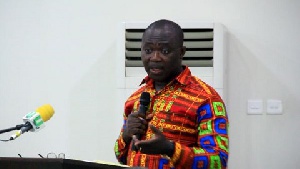It is almost impossible to expect maximum output from people when you invest very little in them, hence the very substandard productivity we have in the country’s public service, Policy Director at the Trades Unions Congress (TUC), Dr. Kwabena Nyarko Otoo has observed.
He cited meagre salaries and poor working conditions as a major reason staff in the public service do not churn out their best leading to the employment of consultants to aid in policy implementation.
Speaking at the third IDEG roundtable on local governance reforms and public service institutions Wednesday, Dr. Nyarko Otoo noted;
“Low capacity in the public sector….we are poorly paying them and they are giving us our monies worth. If we can up the salary levels in the public service, then we can attract people of competence. It is possible that some of the special assistants will find the public and civil service attractive and they will join to deliver the competence that we are all craving for unfortunately we have failed to do that so when for instance we hear about the ballooning wage bill, let us check who is taking what. I think it is about time you solved the problems in the public service”
“The permanent solution is to make conditions attractive in the public service so that people of competence will actually feel encouraged to join the civil service to deliver the programs we want them to deliver”, he said.
He was keen on recruitment processes as far as the public service is concerned. He believes competence will remain lacking if due diligence is not followed in the process of engaging people for the various positions in public service; ‘people need to rise by competitive examination’, he stressed.
“The problems are there, all the commissions have made recommendations, but they also fail to account for how people get into the public service and as the HR people will tell you, when recruitment goes wrong, no amount of training can correct it. We need to be a bit bolder, the Korean experience is that, to enter the public service, it’s by competitive examination, probably we have to get there. The situation where every year, every two years, I’ve stayed here without promotion should come to an end. This ‘MBA’ business will not help us”, he stated.
Meanwhile, Dr. Nyarko Otoo expressed concern about accountability of public service holders and the role persons under them play in keeping them on their toes. In his opinion, loyalty to authority should not imply ‘covering up’ the ‘dirt’ of these people under which they serve.
“The civil servants are supposed to be loyal to the ministers. Does it also mean they must be loyal to the minister even if the minister is doing the wrong thing, if the minister is not loyal to Ghana, has the secretary a responsibility to draw his attention? And if he fails? Has he got a responsibility to the people of Ghana to leak when he feels like what the minister is doing is not in the best interest of Ghana?”.
The Institute for Democratic Governance (IDEG) convened a round table on the theme: “Of Technical Advisors, Special Advisors and Personal Assistants: How complementary and effective is their role to public service delivery in Ghana?”.
The roundtable, among other things was aimed at examining the appointments of non-career officials in the public sector and their implications for productivity and effectiveness of the sector.
Speakers at the roundtable included Janet Fofie, Chairman, Public Services Commission; Dr. Yaw Baah, Secretary General, Trades Union Congress (TUC); Dr. Kwaku Ofosu-Adarkwa, Retired Chief Director, Communication Ministry and Godfrey Ewool, Former Technical Assistance Adviser, Local Government Ministry.
Business News of Wednesday, 17 October 2018
Source: www.ghanaweb.com













